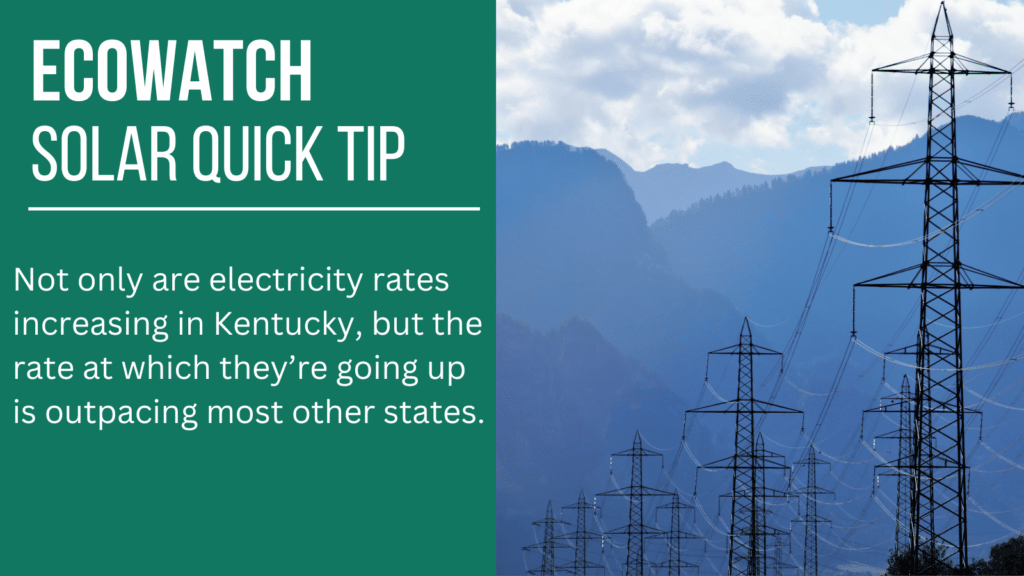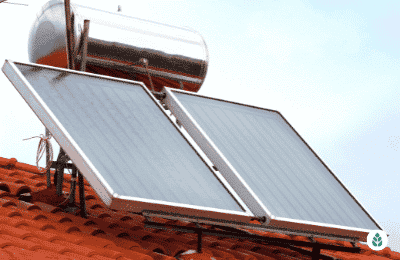
Solar Panel Cost in Kentucky (2024 Local Savings Guide)
In this guide on Kentucky solar panel costs, you’ll learn:
- How do Kentucky solar costs compare to the national average?
- How are solar panel costs trending in Kentucky?
- How can you save money when converting to solar in Kentucky?
Each product and or company featured here has been independently selected by the writer. You can learn more about our review methodology here. If you make a purchase using the links included, we may earn commission.
How Much Do Solar Panels Cost in Kentucky?
The average solar customer in Kentucky pays around $23,562 for a solar photovoltaic (PV) system, which takes the federal tax credit into consideration. Before the credit, the typical cost of solar photovoltaic (PV) panels is closer to $33,660 in Kentucky.
These numbers are based on averages in the area, including a per-watt price of $3.06 and a system size requirement of 11 kilowatts (kW). An 11 kW system is typical in Kentucky for an average monthly energy consumption of 1,073 kilowatt-hours (kWh).
Most property owners in Kentucky pay between $17,136 and $29,988 for their systems after the tax credit or between $24,480 and $42,840 after the credit is considered. We’ll include some typical pricing in your area in the chart below based on system size and your home’s square footage.
| Size of Your Solar Power System | Total System Price Before Any Rebates or Credits | Total System Price After Federal Tax Credit | Typical Home Size for Which The System Would Be Appropriate |
| 8 kW | $24,480 | $17,136 | 1,100 sq ft |
| 9 kW | $27,540 | $19,278 | 1,300 sq ft |
| 10 kW | $30,600 | $21,420 | 1,500 sq ft |
| 11 kW | $33,660 | $23,562 | 1,750 sq ft |
| 12 kW | $36,720 | $25,704 | 1900 sq ft |
| 13 kW | $39,780 | $27,846 | 2,100 sq ft |
| 14 kW | $42,840 | $29,988 | 2,300 sq ft |

Blue Raven Solar
Pros
- Industry-leading in-house financing
- Competitive pricing
- Excellent reputation
Cons
- Doesn't offer solar batteries (coming 2022)

Blue Raven Solar
Pros
- Industry-leading in-house financing
- Competitive pricing
- Excellent reputation
Cons
- Doesn't offer solar batteries (coming 2022)

Icon Solar
Regional Service
Average cost
Pros
- Many years of experience
- Comprehensive service offerings
- Great warranty coverage
Cons
- No leases or PPAs
How Does the Current Cost of Solar in Kentucky Compare to the National Average?
Kentuckians pay an average of $3.06 per watt for solar equipment, which is one the lowest average cost of solar panels in the country and well below the national average of $3.33. That means that your money will go further in Kentucky than in any other state when converting to solar.
However, Kentucky residents use far more energy than most U.S. residents, so they need larger systems that end up costing above the national total. The average all-in system price in the Bluegrass State is $23,562 after the credit, while the equivalent cost in the nation is $20,979.
More panels are needed to offset higher rates of consumption, so the larger system size leads to a higher overall cost in Kentucky.
Watch Below: Learn What To Know Before Going Solar in Kentucky
How Are Solar Costs Trending in Kentucky?
According to the Solar Energy Industries Association (SEIA), the cost of PV panels in Kentucky has gone down approximately 53% in the past decade.1 Ten years ago, the average cost of a solar energy system in your area was around $67,000 pre-credit. Solar equipment is more affordable in Kentucky now than it ever has been before.
Along with the overall popularity, resilience and importance of solar and clean energy sources, further advancements in solar panel efficiency and manufacturing will very likely lead to continuous drops in equipment costs. We expect that the next few years will bring even lower solar equipment prices for Kentuckians.
While it might seem like a good idea to wait for prices to go down even more before converting to solar, it’s generally best to adopt renewable energy sooner rather than later. This is especially true because of the gradual increase in electricity costs in Kentucky.
Over the last year alone, electricity prices in Kentucky have gone up 16.5%.2 In that same time, the average increase in U.S. electricity rates as a whole has been slightly lower, at 16.0%. Not only are electricity rates increasing in Kentucky, but the rate at which they’re going up is outpacing most other states.
Rising energy costs combined with decreasing solar equipment costs means that converting to solar now is most beneficial. You’ll lock in an effectively lower cost of energy and reduce your carbon footprint and reliance on fossil fuels.
How Much Can You Save By Going Solar in Kentucky Today?
A properly-sized solar system in Kentucky can save an average of $25,118 on utility bills over its lifespan, not taking into consideration rising energy costs. Since electricity prices are still on the rise in Kentucky, the likelihood is that you’ll save even more.
These estimated savings are based on a cash purchase, and the payment method you choose can bring this number down. In the chart below and the following sections, we’ll explain the three primary solar payment options and how each one can affect your long-term solar savings.
You can also use this solar calculator to estimate your expected savings.
| Solar Financing Option | Upfront Cost | Payback Timeline | Est 25-Year Savings |
| Cash | $23,562 on average in KY (after the federal tax credit is applied) | 13 years* | $25,118* |
| Loan | Often $0, but a down payment can help bring down your interest rate and your long-term costs of solar conversion | 16 years* | $20,000* |
| Lease | Almost always $0 | N/A | $6,000 |
*These are conservative estimates intended to represent base-level averages. In most cases, customers can see an even higher ROI and shorter payback timelines.
Cash Purchase of Solar System
Buying your home solar energy system in cash is the simplest way to convert your home to clean energy. You don’t need to secure financing or a lease agreement, so you don’t need any credit check or specific credit score.
Cash purchases avoid interest, which means you’ll end up spending less on your equipment in the long run if you choose this payment method. That also means the payback period for your solar system will be as short as possible, and your long-term savings will be as high as they can possibly be.
The major downside to paying in cash is that you’ll need to pay the entire system price right away, which averages around $33,600. Remember, the ITC only gets applied when you file your taxes, so you’ll still have to make the pre-credit payment initially.
Many customers try to optimize their monthly payments for their equipment to keep it below what they currently pay for electricity. Unfortunately, a cash purchase doesn’t let you do this, as your entire system price will be paid prior to installation.
Below are some of the pros and cons of acquiring your panels with a cash purchase in Kentucky:
+ No credit score required
+ Leads to panel ownership
+ Yields the highest long-term savings
+ Requires the lowest all-in system cost
+ Lets you take advantage of all solar incentives and exemptions
– Highest initial cost of any payment method
Solar Loan
A solar panel loan works just like any other financing method: you take out a loan to cover the cost of the panels, and then you make a monthly payment that includes a portion of the system cost plus interest.
In many cases, financiers will make sure to keep your estimated monthly payment under what you currently pay for electricity. That means you can get access to solar, upgrade your home and pay less than you currently do per month for energy. In Kentucky, that estimated maximum is around $132,94.
Loans are one of the most popular payment methods for PV equipment because they make renewable energy far more accessible. They typically come with $0-down or small down payment requirements to open the equipment up to more property owners.
The downside of financing your panels is the interest you’ll pay on your system total. The interest will drive up the all-in cost of your system in the long run and will therefore bring down your estimated lifetime savings. The average amount of interest customers in Kentucky pay on a PV equipment loan is around $5,000.
Below are some of the most significant upsides and downsides to using a loan to acquire your solar system.
- Far more accessible than cash payments
- Often comes with no down payment requirements
- Lets you take advantage of all solar incentive programs
- Monthly payments can be made to be lower than current utility bills
- Leads to panel ownership
- Requires a credit check and good credit
- Increases payback period
- Bumps up your total system price
Solar Lease
A solar lease agreement is a bit different because it does not lead to panel ownership. Instead, you lease the equipment from a solar panel installation company for a fixed monthly rate, and you get to use all of the energy the panels produce to offset your electric bills.
In most cases, lease companies will set your monthly leasing cost at a price below your current electric bill. That means you can support the renewable energy movement without making any major financial commitment and instead signing up for savings over time.
While leases will save most Kentucky property owners money in the long run, they save far less than cash purchases — around 30% — and loan options — around 35%.
Most importantly, leases don’t lead to panel ownership, which is why there is no payback period. That means there’s never a point where your panels are purely saving you money like there would be if you choose a cash purchase or solar financing.
Another major downside to leases is that they don’t let you take advantage of the federal tax credit, which is one of the best incentives in the entire solar industry. Plus, they can come with steep cancellation fees but can make your home less desirable if you go to sell without canceling.
However, leases are very accessible, as they have no down payment requirements and typically don’t require exceptional credit.
Below are some of the most important benefits and drawbacks of choosing a solar lease in Kentucky.
- Almost never any down payment requirement
- Usually doesn’t require great credit
- Lets you join the solar energy movement with minimal investment
- Often reduces your current monthly energy expenditure
- Doesn’t lead to panel ownership
- Yields the lowest overall savings
- Can include high cancellation fees
- Doesn’t let you take the federal solar investment tax credit
How Do You Get the Best Solar Prices in Kentucky?
With the cost of a solar energy system in Kentucky averaging over $33,500 before state incentives, most homeowners will understandably look for ways to save money in the conversion process. Thankfully, there are a few things you can do to bring your system total down and maximize your long-term savings. These include:
- Taking the federal solar tax credit
- Taking advantage of net metering
- Choosing a high-efficiency panel brand
- Getting multiple solar quotes before hiring an installer
In the sections below, we’ll discuss how each of these strategies can save you money when adopting solar.
File for the Federal Tax Credit
As we mentioned above, the federal solar tax credit (ITC) is one of the most appealing and substantial tax incentives in the entire industry, and it’s massively beneficial in Kentucky.
The credit is for 30% of your entire system price, which, in Kentucky, averages out to around $10,098. This amount gets applied to your income tax liability for the year your system is installed, and any remaining credit can be applied to the following four tax years.
It’s crucial to understand that this credit is not a rebate, and the credit amount instead affects how much you owe for income taxes. If you typically owe $0 or the government owes you money, you won’t be able to take advantage of this perk. If you expect to owe at least $1,500 per year for the next five years, then you’ll be able to take close to the full credit.
The ITC is such a great incentive not only because it can effectively bring down the cost of converting to solar in Kentucky but also because the application process is quick and painless. You just need to fill out IRS form 5695 and file it along with your taxes.3
Take Advantage of Net Metering
In our opinion, net energy metering is the second-best solar perk in Kentucky, and it’s also one of the best ways to save money on your solar system. While net metering won’t bring down the initial cost of conversion, it will help you pay off your system more quickly and usually leads to higher overall savings.
Net energy metering credits you for the energy you produce with your panels and fail to use. Those credits from excess energy can pay down future bills, which is helpful if your energy production ever drops or consumption rises, as it often does in Kentucky’s hot summers.
The Public Utilities Commission in Kentucky currently makes net metering a requirement for all utility providers in the state, except the Tennessee Valley Authority (TVA). It also sets the credit rate at the retail rate for electricity, which is ideal.
Taking advantage of net energy metering in Kentucky is usually simple. You can just call your utility company to confirm you have a bi-directional meter, and have your solar installation company apply for an interconnection agreement. Following an inspection or two (the logistics of which will be handled by your installer), you can then rest assured that your system will generate credits for you.
Calculating the exact savings you’ll see with net energy metering is challenging, but it does help you move closer to the average lifetime savings of $25,118 when going solar in Kentucky. Keep in mind that these savings are enjoyed after the panels pay for themselves, which is also sped up by net energy metering.
Choose a High-Efficiency Panel Brand
As a Kentucky resident, you’ll have access to a variety of solar panel brands, thanks to the growing local market for PV panels. The brands differ in price, warranty coverage and durability, as well as efficiency. The efficiency rating of a panel determines how much sunlight that hits the panel will be converted into energy.
Kentucky only receives around 189 sunny days per year, which is well below the U.S. average of 205 days.4 The lack of sunlight, combined with the above-average energy consumption, means a high-efficiency solar panel brand is often required to offset energy needs in your area.
Higher-efficiency brands will sometimes cost more upfront, but they often save you money over time. They can reduce more of your energy bills, thereby increasing your overall savings.
Below are some of the panel brands that should serve you well in terms of efficiency:
- Maxeon/SunPower
- Tesla solar
- Qcells
- REC
- Panasonic
- Trina Solar
- Canadian Solar
Get Multiple Solar Quotes
Finally, we recommend that you get a few different quotes and shop around for the best prices.
According to the SEIA, Kentucky is home to 15 installers, all of which charge different prices for their equipment and labor.5 Some companies only carry high-efficiency and high-quality panels and batteries, which tend to be more costly upfront but can save you money over time. Some also discount their installation services to make solar more accessible.
We suggest getting a few quotes from companies and comparing them, but it’s important to consider a few factors in doing so. These include:
- The total cost for your system
- The quality of the equipment being installed
- The warranty coverage
- The durability of the brands the company offers
What Factors Affect the Average Cost of Solar Panel Systems in Kentucky?
Photovoltaic panels generally range from around $17,136 up to $29,988 in Kentucky after the tax credit. The price can vary so much because there are a bunch of things that influence what you’ll pay for your equipment and the labor to install it. We’ll discuss the most significant solar cost factors in Kentucky below.
Solar Equipment
The type of solar equipment you choose for your home will always make a difference in your total cost to go solar. Both the specific pieces of equipment you choose and what brands they are affect your cost.
Kentuckians only get around 189 sunny days per year. The lack of available sunshine means that higher-efficiency panels, which are costlier, are usually needed to offset electric bills entirely.
The need for high-performance panels will naturally drive up the cost to go solar, especially if other factors — like shading on your roof — further reduce the amount of available sunlight.
Luckily, Kentucky doesn’t experience much extreme weather, so most homeowners don’t need to add on solar batteries to provide power through outages like they might in other parts of Tornado Alley that experience more outages. The lack of need for batteries tends to lower the price of solar systems somewhat in KY.
Kentucky Solar Installation Company
Aside from solar equipment type and brand and system financing mechanism, the company you select to install your equipment is a major factor in pricing.
Different companies have their own labor rates and equipment charges, so across different companies you could be looking at prices that are hundreds or thousands of dollars apart for the exact same system.
Additionally, each solar company offers different solar panel and battery brands, which vary in price.
Solar Energy Solutions, a small local solar company in Kentucky, installs panels from:
- SunPower
- Tesla
- Trina and
- Canadian Solar.
Opting for this company and choosing one of the more affordable brands can yield a lower price than choosing SunPower as your installer, for example.
SunPower is a national company that operates in Kentucky. It installs just one brand that happens to be quite expensive.
It’s important to remember that not all PV panels are created equal, so you should consider comparing the installers and brands available to you based on price and overall quality.
Solar Financing in Kentucky
As we mentioned above, PV panels often total near $24,000 after the ITC (solar investment tax credit) is applied, and how you pay for your panels is another factor that will influence your total.
For example, financing with a solar loan is a popular option that lets you defer the total cost, but you’ll end up paying more over time because of the interest. Choosing a cash purchase will lead to the lowest overall cost and the highest overall savings, but it does require a large initial outlay of cash.
Kentucky makes solar financing affordable and accessible through a few different loan programs. The first is the Property Assessed Clean Energy (PACE) program, which limits interest rates and loan terms to keep costs to a minimum.
Unfortunately, Kentucky doesn’t have a dedicated loan program for low-income households, but certain municipalities within KY do. For example, Louisville offers the Solar Over Louisville program, which gives homeowners access to significant discounts on going solar.
Are There Any Maintenance Costs of Going Solar in Kentucky?
Thankfully, there aren’t any significant maintenance costs you need to worry about in Kentucky. Despite being exposed to the elements — even in Kentucky’s sometimes extreme weather — most solar systems don’t require much in the way of maintenance.6
One of the most common maintenance requests for panels in some areas is panel cleaning. This process removes dirt, pollen, dust and other debris that can reduce panel efficiency.
However, Kentucky sees above-average rainfall throughout the year, and the precipitation should be plenty to keep your panels clean.7 If you do need cleaning, expect to pay between $100 and $150.
Another common request is panel removal to address roof leaks or to replace the roof underneath. Provided you hire a reputable installer, your solar company should tell you if it’s wise to replace your roof before going solar. This should help avoid having to remove your panels after they’re installed.
Since Kentucky does see above-average amounts of rainfall and some extreme weather, it’s possible that you will still need this service. This should only be on an as-needed basis in case of a leak, and the cost is often around $500.
Typical Costs of Solar Providers In Kentucky
As we mentioned above, the price you pay for your PV equipment and the labor to install it will have a significant impact on your total system price. Below, we’ll include a quick list of some of the top solar installers in Kentucky, along with relative pricing information.
| Solar Installer | Average Installation Cost Per Watt ($-$$$$$) |
| SunPower | $$$$ |
| Blue Raven Solar | $$ |
| Solar Energy Solutions | $$$ |
| Solar Is Freedom | $$ |
| Icon Solar | $$$ |
Read More About Going Solar in Kentucky
- Best Solar Installers for Your Home in Kentucky
- Guide to Kentucky Solar Incentives
- Is Going Solar Worth It in Kentucky?
- Solar Panels in Kentucky: What to Know Before Buying
The cost information presented in this article is derived from a comprehensive analysis, incorporating data from multiple industry sources. The average cost per watt per state was calculated based on figures from Consumer Affairs, Energy Sage, and Berkeley Lab’s Electricity Markets & Policy Department. Additionally, monthly energy consumption and the average monthly cost of electricity were sourced from the U.S. Energy Information Administration, ensuring a well-rounded and accurate representation of the information presented.
FAQs: Solar Panel Cost Kentucky
In the sections below, we’ll provide our responses to the questions we get most frequently from prospective solar customers in Kentucky.
The typical cost of PV panels in Kentucky is $3.06 per watt or $23,562 for the average 11-kW solar power system. A solar system in Kentucky also qualifies for the 30% federal tax credit, which would give you an additional savings of about $10,098.
Yes, data from Zillow shows that adding solar boosts property value and that homes with PV panels tend to sell for 4.1% more than homes without.9 It’s important to remember that you can only capitalize on the increase of your Kentucky home’s value if you own your solar system and not if you have a solar lease.
It’s always better to buy your PV panels if you can because you can’t enjoy all of the benefits of going solar if you don’t own your solar system. For instance, if you choose to lease PV panels, you will not be able to claim the federal tax credit or take advantage of increased property value.
No, PV panels are never free. Some companies may advertise “free solar panels,” but what they’re really offering are solar leases or power purchase agreements (PPAs). We don’t recommend leasing your PV panels because you won’t be able to capitalize on all of the benefits of going solar if you don’t own your panels.
Depending on your energy needs and local electricity prices, PV panels can eliminate your energy bills in Kentucky, especially if your utility offers a good net metering program. If your solar system generates more energy than what you need to power your home, you’ll not only reduce your electric bill, but you’ll receive credits from your utility company to use on months when your electricity costs are higher.
Related articles
Top Solar Installers In Kentucky Cities
Comparing authorized solar partners
-
- Industry-leading in-house financing
- Competitive pricing
- Excellent reputation
- Doesn't offer solar batteries (coming 2022)
A+Best Solar Financing2014Trina Solar, Canadian Solar, SolarEdge, Silfab, SunPower25-year manufacturer warranty; 10-year workmanship warranty, 2-year production guarantee
Having trouble deciding? Click below and use our process to receive multiple quotes instead:

 233k
233k  41k
41k  Subscribe
Subscribe 








